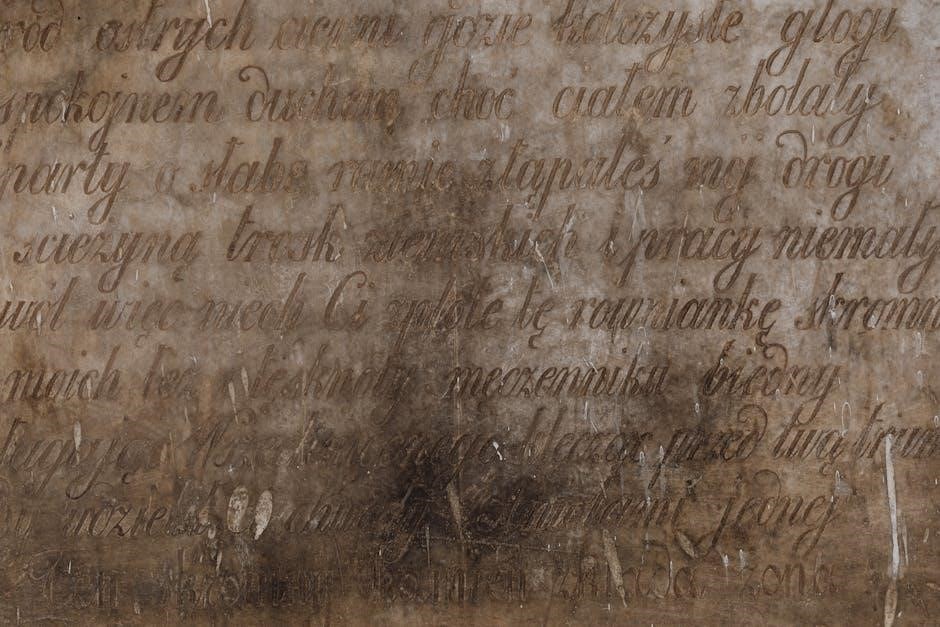A character reference letter for court is a formal document detailing an individual’s moral integrity, written by someone acquainted with their good behavior and character traits.
1.1 Purpose of a Character Reference Letter
A character reference letter is written to attest to an individual’s moral standing, providing insights into their integrity, honesty, and positive traits. It is often used in legal proceedings to support someone facing charges or custody disputes, offering a personal perspective that highlights their good character and contributions to society.
1.2 Importance of a Character Reference in Legal Proceedings
A character reference letter holds significant weight in legal proceedings, as it provides insight into an individual’s moral character and reputation. Judges often consider these letters when assessing sentencing or custody matters, using them to gauge the defendant’s credibility and potential for rehabilitation. A well-written reference can influence leniency, demonstrating the individual’s positive contributions and commitment to societal norms.
Structure of a Sample Character Reference Letter
A character reference letter typically includes a header with contact information and date, a body detailing the writer’s relationship and the individual’s character, and a footer with a closing statement and signature, ensuring clarity and professionalism throughout.
2.1 Header: Contact Information and Date
The header of a character reference letter should include the writer’s full name, mailing address, phone number, and email address, followed by the date of writing. This ensures the court can verify the authenticity of the letter. Including professional letterhead is recommended for credibility. The date helps establish the timeline for the reference, making the document legally valid and traceable. Proper formatting enhances professionalism and clarity.

The body begins with a brief introduction stating the purpose of the letter. It then describes the writer’s relationship with the individual, including how long they’ve known them and in what capacity. Specific examples of the person’s good character, such as honesty, responsibility, and kindness, are provided to illustrate their positive traits. This section should be concise yet detailed to effectively convey the individual’s moral standing and reputation.
2.3 Footer: Closing Statement and Signature
The footer concludes the letter with a polite closing statement, such as “Sincerely” or “Respectfully,” followed by the writer’s full name, position (if applicable), and contact information. This ensures the court can verify the letter’s authenticity. A handwritten or typed signature is essential to validate the document, demonstrating the writer’s commitment to the testimony provided. This section maintains professionalism and completeness.
Key Components of an Effective Character Reference Letter
The letter must include personal information, specific examples of the individual’s good character, and a formal tone to ensure credibility and impact in legal proceedings.
3.1 Personal Information and Credibility
Your name, address, phone number, and email should be included to verify your identity. Clearly state your occupation and how long you’ve known the individual to establish credibility.
3.2 Specific Examples of the Individual’s Good Character
Include specific examples of the individual’s positive traits, such as honesty, reliability, or kindness. Describe situations where they demonstrated integrity or empathy. Avoid generic statements; instead, provide concrete anecdotes that highlight their moral character. For example, mention community involvement, acts of kindness, or personal sacrifices that showcase their good behavior and reputation in the community.
3;3 Tone and Language: Formality and Respect
Maintain a respectful and formal tone throughout the letter. Avoid slang or casual language, as the document is intended for a legal audience. Use clear, concise sentences to convey your message professionally. Ensure the language reflects the gravity of the situation while respectfully highlighting the individual’s positive qualities. This approach ensures the letter is taken seriously and presents the individual in the best possible light.

Sample Character Reference Letter for Court (PDF Template)
Download a professional PDF template designed to help you craft a compelling character reference letter for court, complete with structured sections and formatting guidance.
4.1 Downloadable Formats: PDF and Word
Character reference letters for court are available in downloadable PDF and Word formats, offering convenience and adaptability. PDF templates maintain a professional structure and formatting, while Word documents allow customization to suit individual needs. Both formats are user-friendly and can be easily edited to include specific details about the individual’s character, ensuring clarity and professionalism in the final document.

4.2 Customization Tips for the Template
Customize the template by personalizing the introduction with your relationship to the individual. Include specific examples of their positive traits and actions. Maintain a formal tone while ensuring sincerity. Add your contact information for verification. Avoid generic statements and focus on unique qualities. Proofread the letter for clarity and accuracy before submission. Ensure compliance with court requirements and seek legal advice if necessary to enhance its impact.

Legal Considerations When Writing a Character Reference
Honesty and ethical standards are crucial when writing a character reference letter. Ensure all statements are truthful and align with legal requirements. Include contact information for verification.
5.1 Ethical Standards and Honesty in the Letter
Honesty is paramount when drafting a character reference letter. Avoid exaggerations or misrepresentations, ensuring all statements are truthful and factual. Ethical standards require the letter to reflect the individual’s genuine character without bias. Including accurate contact information enhances credibility, as courts may verify details. Dishonesty can undermine the letter’s impact and potentially lead to legal consequences, emphasizing the importance of integrity in its composition;
5.2 Understanding the Court’s Requirements
Courts often specify requirements for character reference letters, such as format, tone, and content. Ensure the letter includes the case number, court name, and adheres to submission deadlines. Using a business block format and proper language is essential. Verify if the court requires notarization or specific details about the defendant’s character. Understanding these guidelines ensures the letter is accepted and considered during legal proceedings.

Common Mistakes to Avoid in a Character Reference Letter
Overemphasis on irrelevant details, lack of specificity, and informal tone can undermine credibility. Avoid exaggerations, unverifiable claims, and including false information, as these may harm the case.
6.1 Overemphasis on Irrelevant Details
Avoid including unnecessary anecdotes or unrelated achievements, as they distract from the letter’s purpose. Focus solely on the individual’s character traits and positive attributes. Irrelevant details, such as hobbies or unrelated work history, may dilute the letter’s impact. Stick to specific examples that demonstrate the person’s integrity, honesty, and reliability. Avoid emotional appeals or opinions not supported by concrete examples, ensuring the letter remains focused and credible.

6.2 Lack of Specificity in Examples
Avoid vague statements like “they are a good person” without supporting evidence. Instead, provide specific examples of the individual’s positive actions or character traits. General claims lack credibility and may be dismissed by the court. Include concrete instances, such as dates, actions, and outcomes, to demonstrate their reliability and moral integrity. Specificity strengthens the letter’s persuasiveness and ensures it is taken seriously by legal authorities.

How to Write a Compelling Character Reference Letter
Focus on clarity and sincerity, providing specific examples of the individual’s good character. Ensure the letter is well-structured, formal, and tailored to the court’s requirements, helping judges understand the person’s moral standing and contributions to society.
7.1 Outlining the Letter Before Writing
Start by outlining the letter to ensure clarity and organization. Identify key sections: introduction, relationship, character testimony, and closing. Include specific examples of the individual’s positive traits and contributions. Maintain a formal tone and structure to present a credible and persuasive argument. This approach helps ensure the letter is coherent, impactful, and aligned with the court’s expectations for character references.
7.2 Ensuring Clarity and Conciseness
Clarity and conciseness are crucial in a character reference letter. Avoid unnecessary details or overly emotional language. Use straightforward, formal language to convey your points effectively. Ensure each paragraph focuses on a specific aspect of the individual’s character, such as honesty, responsibility, or kindness. Keep sentences concise to maintain the reader’s attention and ensure the letter is easy to understand. This approach strengthens the letter’s impact and professionalism.

Examples of Successful Character Reference Letters
Successful examples highlight specific traits, such as honesty or responsibility, demonstrating the individual’s positive character through real-life scenarios, aiding the court in understanding their moral standing.
8.1 Letters for Criminal Cases
Letters for criminal cases focus on the defendant’s moral character, providing context to their actions. They highlight positive traits, such as honesty or responsibility, and include specific examples. The tone must be sincere and respectful, avoiding exaggerated claims. These letters help judges assess the individual’s character, potentially influencing sentencing decisions. A well-structured letter can make a significant difference in criminal proceedings, offering a personal perspective on the defendant’s behavior and attitudes. Ensure clarity and conciseness, sticking to relevant details only. Using a PDF template can help maintain a professional format.

8.2 Letters for Family Court Proceedings
Letters for family court proceedings emphasize the individual’s suitability as a parent or caregiver. They highlight stability, responsibility, and ability to provide a nurturing environment. Specific examples of positive interactions with children are crucial. The tone should reflect empathy and understanding. These letters support custody or visitation claims, demonstrating the writer’s confidence in the individual’s capabilities. Customize the sample PDF template to address specific family dynamics and legal requirements, ensuring the letter is both heartfelt and professional.
Submitting the Character Reference Letter to the Court
Ensure the letter is submitted by the court’s deadline, following specified guidelines. Verify authenticity and proper formatting. Downloadable PDF templates can help ensure compliance and clarity.
9.1 Deadline and Submission Guidelines
Submit the character reference letter by the court’s specified deadline to ensure it is considered. Follow submission guidelines, which may include mailing, emailing, or delivering in person. Ensure the letter is properly formatted and includes all required contact information for verification. Check with the court clerk or legal advisor for specific instructions to avoid delays or rejection of the document.
9.2 Verifying the Letter’s Authenticity
The court may verify the letter’s authenticity by contacting the author using the provided contact information. Including a signature and official letterhead enhances credibility. Ensure the letter is dated and written on professional stationary if possible. In some cases, notarization may be required to confirm the document’s legitimacy. Providing specific examples of the individual’s good character strengthens the letter’s authenticity and trustworthiness in legal proceedings;
A well-crafted character reference letter can significantly impact court proceedings, offering valuable insight into an individual’s character and supporting their case with honesty and sincerity.
10.1 Final Tips for Writing an Impactful Letter
Ensure your letter is honest, clear, and concise. Use specific examples to demonstrate the individual’s positive traits and character. Maintain a respectful and formal tone throughout. Avoid exaggerations or irrelevant details. Proofread for clarity and accuracy. Submit the letter well before the deadline. Consider customizing a sample template to fit the situation. Always verify court requirements and formatting guidelines to ensure compliance. Your sincerity and thoughtfulness will make the letter more impactful and credible to the court.
